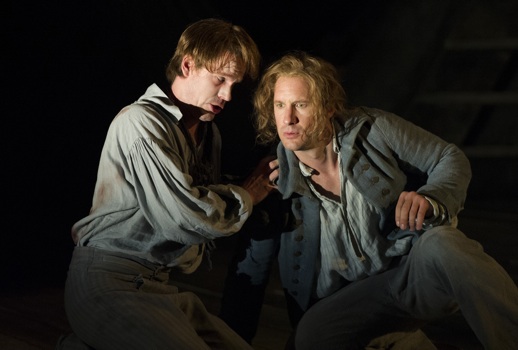
The occasion is subtly unlike the technological marvel John Dexter created for the Met in 1978. That overwhelming design with its multiple stage elevators presents the H.M.S. Indomitable as a vast and airy yacht whereon it might be pleasant to cruise the Channel and perhaps romance the Captain’s sister, cousin or aunt. Christopher Oram’s set at BAM is equally nautical, but we are deep within the cramped hull, mostly below decks with the rebellious riffraff, and this emphasizes the claustrophobic plot.
Angelic Billy atop the mizzenmast may rejoice in the tiny deck below him against the vast sea, but diabolical “Jemmy Legs” lurks below and cannot be avoided forever. Tormented, idealistic Captain Vere, theoretically absolute sovereign of his “little piece of earth,” will prove helpless to protect virtue from vice when fear enters the picture. There has been a mutiny in the British Navy recently, and revolution in France—to say nothing (and no one mentions it) of successful revolt in the American colonies.
What the British sailors, officers and otherwise, feel they need is warlike action. Here Britten, the bitter pacifist, lays on his scorn with an ironic trowel: His rituals of battle and (later) execution are parodies of the sumptuous military display in a hundred grand operas, but here they accompany not nationalistic triumph but a pointless, one-shot standoff and, later, the execution of an innocent man.
The smaller size of the BAM opera house and the menacing set with its looming galleries and distant shadows have the effect of bringing the opera’s action closer to us. Too, the cast’s fine diction reaches out to us and we require subtitles only for the bits of old nautical slang. (The titles are turned off for Vere’s haunted prologue and epilogue; Mark Padmore, as Vere, brings out every syllable.) The crew on deck or in quarters have never seemed so cramped, and there were hisses of indrawn breath around me during our close, abrupt look at the Novice (a lively Peter Gijsbertsen) after his back has taken twenty lashes.
We are close enough to feel the seething malice of the Master-at-Arms, John “Jemmy Legs” Claggart (Brindley Sherratt). This Claggart does not merely haunt the decks with stance and walk; he leans into the necks of his victims as if intending to sink his fangs, and when he addresses his minion, Squeak (Colin Judson), his growling, prowling bass produces an appropriate high-pitched sound. Why clobber the fellow when a taunt will do the job? In his lowest tones, Sherratt appeared to be prodding the depths for diabolic companionship.
One has seen taller, handsomer Billys than Jacques Imbrailo, but he acted tall, sweet and sure of his simple view of the world, so that one understood his being an object of general affection. His light baritone took on the colors of exultation for his song to the birds and of despair for “Billy in the Darbies.” If this soliloquy was not as dulcet as it has been heard, it was sung and acted with utter conviction, from thought to uneasy thought. Besides, his hands were bound behind him. We felt as one with the broken Dansker (Jeremy White), who represents the crew making a personal farewell to Billy.
The staging was full of small, vivid touches, bringing forward scenes one could miss in a larger production and theater: Duncan Rock attempting to comfort his whipped friend the Novice, Billy’s naïve delight in his new surroundings, the riot that nearly breaks out among the sailors when Billy swings from the yardarms. The crispness of natural movement, the energy of the staging contrasted with the rather flaccid habit the Met’s production has fallen into in recent revivals. The atmosphere was not merely described (“I don’t like the look of the mist,” says Captain Vere firmly, referring by indirection to the moral dilemma in which he will shortly find himself), but fills the stage.
Characters loom like specters from the shadowy fog: sinister Claggart, his tyrannized toadies and—stunningly, disturbingly—Vere himself, behind Billy in the Darbies, hatless and among the crowd of sailors rather than uniformed with the officers above. Vere is already a ghost of himself, beginning to realize the extent of his sin and betrayal. Padmore acts his Pilate role with rigid dignity. His singing, dry to begin with (perhaps to imply his age, looking back on these events decades later), attains a liquid, soaring quality in Act II.
The position of the orchestra below and around the set rather than in front of it brings forth its function as accompanist to a lieder-like score. Brasses loom ominously around Claggart (as if he carried their sound in the shadows of his uniform) as he stands on a deck to accuse Billy to Vere. The stuttering percussion that accompanies Billy’s verbal tic seems to float in the air around him. The lulling dream music that is Billy rocking in his hammock will return on his final night. The buzzing flutes might be birds whirring in the air and the saxophones hum as if from an overheated cellar. When Vere points out to his officers that the men are singing (“Singing men are happy men,” he insists), their voices emerge from the very cabin floor.
The London Philharmonic Orchestra was led by Sir Mark Elder, whom I last heard in a set of sparkling Tannhäusers at the Met in 2004. He brought the same polished clarity, precision and propulsion to this wonderful Billy Budd.
Photo Credit: Richard Hubert Smith


